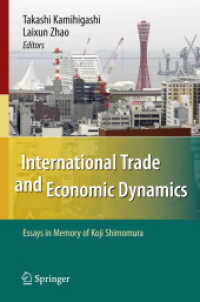- ホーム
- > 洋書
- > 英文書
- > Politics / International Relations
Full Description
In Rising Powers and Foreign Policy Revisionism, Cameron Thies and Mark Nieman examine the identity and behavior of the BRICS (Brazil, Russia, India, China, and South Africa) over time in light of academic and policymaker concerns that rising powers may become more aggressive and conflict-prone. The authors develop a theoretical framework that encapsulates pressures for revisionism through the mechanism of competition and pressures for accommodation and assimilation through the mechanism of socialization. The identity and behavior of the BRICS should be a product of the push and pull of these two forces as mediated by their domestic foreign policy processes.
State identity is investigated qualitatively through the use of role theory and the identification of national role conceptions. Both economic and militarized conflict behavior are examined using Bayesian change-point modeling, which identifies structural breaks in time series data, revealing potential wholesale revision of foreign policy. Using this innovative approach to show that the behavior of rising powers is governed not simply by the structural dynamics of power but also by the roles that these rising powers define for themselves, they assert that this process will likely lead to a much more evolutionary approach to foreign policy and will not necessarily generate international conflict.








